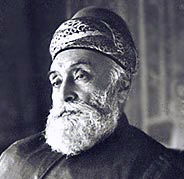Jamshedji Tata
Jamshedji Nasarwanji Tata ( Gujarati જમશેદજી તાતા ; Hindi जमशेदजी टाटा , Jamśedjī Ṭāṭā ; born March 3, 1839 in Navsari in Gujarat , India ; † May 19, 1904 in Bad Nauheim , Germany ) is considered the father of Indian industrialization.
Jamshedji Tata is the founder of the Tata group . He had the Taj Mahal Hotel in Mumbai (Bombay) built in 1903 . The Indian city of Jamshedpur in the state of Jharkhand was named after him.
Jamshedji Tata was Parse .
youth
Jamshedji Tata was born to Nusserwanji and Jeevanbai Tata on March 3, 1839 in Navsari, a small town in southern Gujarat . Nusserwanji Tata was the first businessman in a family of Parish priests. He moved to Bombay to do business there.
Jamshedji moved with him to Bombay at the age of 14 and attended Elphinstone College . He was married to Hirabai Daboo while he was still studying. He graduated from college in 1858 and joined his father's trading company.
Business activities
Jamshedji worked in his father's company until he was 29 years old. In 1868 he founded a trading company with a starting capital of 21,000 rupees. In 1869 he bought a bankrupt oil mill in Chinchpokli , converted it into a cotton mill, and named it Alexandra Mill . He sold the mill two years later for a great profit. He then founded a cotton mill in Nagpur in 1874 . He christened it Empress Mill on January 1, 1877, when Queen Victoria was proclaimed Empress (Empress) of India.
The time after the construction of the Empress Mill was the most important period of Jamsetji's life. In the next thirty years until his death in 1904, Jamshedji laid the foundations for what is now the Tata Group, currently India's largest corporate group.
He dedicated his life to realizing three of his key ideas: The creation of 1. an iron and steel company, 2. an institution for world-class learning, and 3. a hydroelectric power station. He failed to achieve his three goals.
But the foundations he laid and the hard work his successors put into realizing his ideas ultimately enabled the Tata family to achieve all three goals:
- Tata Steel (formerly TISCO - Tata Iron and Steel Company Limited) was Asia's first and is India's largest private integrated iron and steel group with an annual output of 4 million tons of steel.
- The Indian Institute of Science (IISc), a highly regarded postgraduate research and study facility in Bangalore , India offers research programs to postgraduate and graduate students with over 2,000 active researchers working in 48 specialized departments.
- The Tata Power Company Limited is India's largest private electricity company, with an installed generating capacity of over 2,300 MW.
In particular, his eldest son Dorabji Tata stood out, who took over management with his brother Ratan Tata (1871-1918) after his father's death in 1904.
His notable endeavors include building the historic Taj Mahal Hotel in the Colaba District of Mumbai. The hotel was completed on December 16, 1903 and cost approximately 421,000,000 rupees. He died in Bad Nauheim in 1904 during a business trip through the German Empire and was buried in Woking , Surrey .
Merit and Achievement
Founded by Jamshedji Tata, now known as Tata Group, it is now the largest group of companies in India.
When he set up Empress Mills in Nagpur, not only did he break new ground in textile production, but he also ensured good working conditions long before there were laws governing working conditions in India.
Tata was a staunch Indian patriot and nationalist. He maintained connections with activists who at the time campaigned for the end of British colonial rule over India and its independence, such as Dadabhai Naoroji and Pherozeshah Mehta , whose thinking he was strongly influenced. He believed that India's national independence should go hand in hand with economic independence through a self-sufficient Indian industry.
biography
- RM Lala : For the Love of India: The Life and Times of Jamsetji Tata ( ISBN 0-670-05782-7 ) [1]
credentials
- ↑ Family Tree of the Tatas. Retrieved September 9, 2006 .
- ↑ Biography on TIFR website. Retrieved September 9, 2006 .
- ↑ Biography on the official website of Tata. (No longer available online.) Archived from the original on September 4, 2014 ; Retrieved September 9, 2006 . Info: The archive link was inserted automatically and has not yet been checked. Please check the original and archive link according to the instructions and then remove this notice.
- ^ Tata Steel website. (No longer available online.) Archived from the original on January 14, 2005 ; Retrieved September 9, 2006 . Info: The archive link was inserted automatically and has not yet been checked. Please check the original and archive link according to the instructions and then remove this notice.
- ^ IISC website. Retrieved September 9, 2006 .
- ^ Tata Power website. Retrieved September 9, 2006 .
- ↑ Taj Hotels website. Retrieved September 9, 2006 .
Others
- Mark Twain was Tata's guest when the author visited Bombay .
- Jamshedpur , also known as Tatanagar, a city in India in the Indian state of Jharkhand , is named after him. The Tata Group has numerous factories there, including a. Tata Steel .
- Jamshedji Tata was the first Indian to own an automobile in 1901.
Web links
| personal data | |
|---|---|
| SURNAME | Tata, Jamshedji |
| ALTERNATIVE NAMES | Tata, Jamsetji; Tata, Jamshedji Nasarwanji |
| BRIEF DESCRIPTION | Indian entrepreneur; Father of Indian industrialization |
| DATE OF BIRTH | March 3, 1839 |
| PLACE OF BIRTH | Gujarat , India |
| DATE OF DEATH | May 19, 1904 |
| Place of death | Bad Nauheim , Germany |
